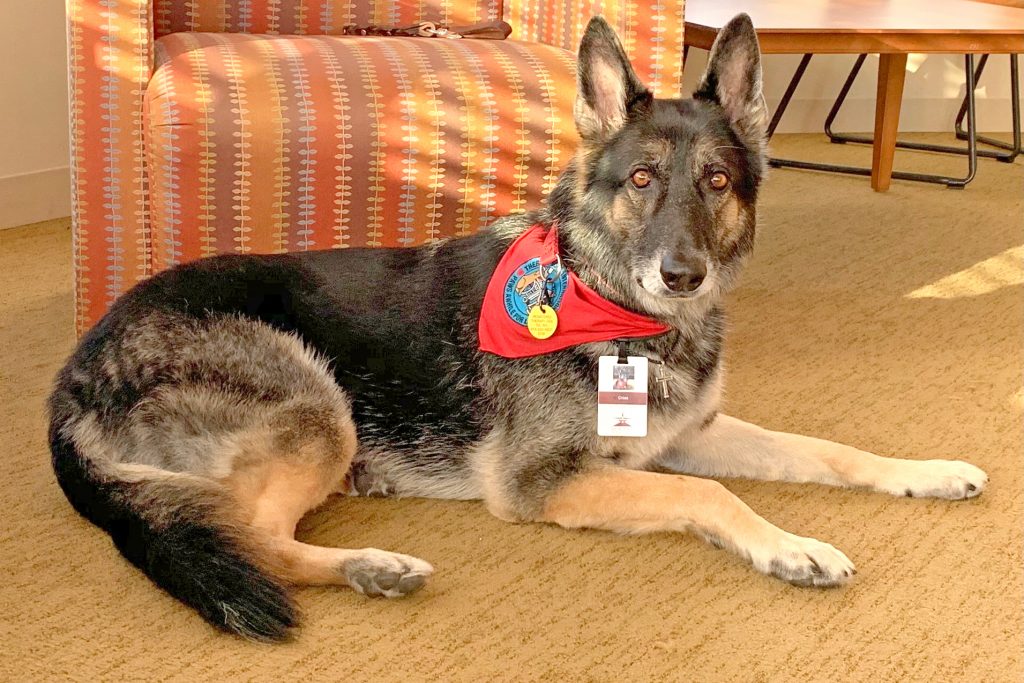The challenge
- One in six adults live with a mental health challenge
- 17.1 million kids in the US have a psychiatric disorder
- One suicide happens every 40 seconds
- More than 23 million American struggle with addiction
With the rate of mental health and addiction challenges growing in children and adults, new and additional resources can help overcome this trend.
Canine Assisted Interventions (CAI):
An additional component to the treatment process
At Rogers Behavioral Health, we know that each child, teen, and adult that receives our care is unique, and not every person makes connections in treatment or personal discoveries in the same way. Experiential therapies, such as art, horticultural, music, recreational, and pet provide additional patheways to understanding a patient’s challenges and how they may cope.
For the last five years, Cross, a caring canine, led the way in demonstrating the value of what was formerly known as pet therapy at Rogers. Rogers Behavioral Health clinicians and patients found his interactions to be a helpful approach for specific patients. Today, with thanks to Cross’ intuitive nature for helping others, the program is being re-imagined into what’s now being called the Canine Assisted Intervention (CAI) program.
Cross touched the lives of thousands of people throughout his work with Rogers. Now it is time to extend his legacy with the vision of helping thousands more through a fully integrated CAI program.
This program will serve as an additional component to the treatment process to help individuals rise above mental health challenges, such as:
OCD and anxiety | Depression | Addiction | Eating disorders | Trauma | Anxiety and depression in autism spectrum disorder
Cross was Cross was a dog of little words, but his heart more than made up for it. Whenever you looked at his chocolate-brown eyes, you knew that he was there for you. It was a feeling more than anything else. A wave of calm that crashed onto your shore. – Jack, former Rogers’ patient
The benefits of CAI
Certified therapy dogs give something special to enhance the health and well-being of others. It has been shown that petting, touching, and talking with animals can lower one’s blood pressure and ease stress.
Regular visits from therapy dogs offer an additional tool for treatment teams to use as a means to assist in the recovery process. As witnessed with Cross, exposure to trained dogs can help patientsthrough the tough work of treatment for mental health challenges. Systematic reviews of small studies yield additional promising information.
- Incorporating dog-related activities can facilitate communication between the therapist and the patient, which increases positive interactions.
- Dogs are in a unique situation to display emotions and behaviors that may not be deemed professionally appropriate for a therapist, such as taking on a comforting role.
- There is evidence to suggest that CAI may help to improve therapeutic processes and quality factors, such as attendance and retention, positive socialization, and feelings of connections in self-selected adolescent populations.
Carry Cross’ work forward
As a strategic ally within experiential therapy programs, CAI is delivered or directed by a qualified or licensed health/human service professional within the scope of their professional practice.
The human and the animal are both trained and/or certified to work safely together to deliver specific mental health interventions. This process is documented and evaluated for efficacy each step of the way,
The need
Rogers Foundation is seeking $250,000 to launch an official Canine Assisted Intervention (CAI) program. Funding will include hiring a fulltime staff member certified in animal assisted interventions.
- Together with the treatment teams, this person will help:
- Determine the level and type of interaction to help bring about a desired result or compliment other areas of treatment.
- Document interactions and observations.
- Develop standardized work to track results and begin gathering data for ongoing outcome studies.
- Continue pilot programs with select diagnoses and age groups to create a successful CAI program, and then roll it out across additional Rogers’ programs and locations.
- Produce and publish reports submitted for reviews and shared industry-wide.
